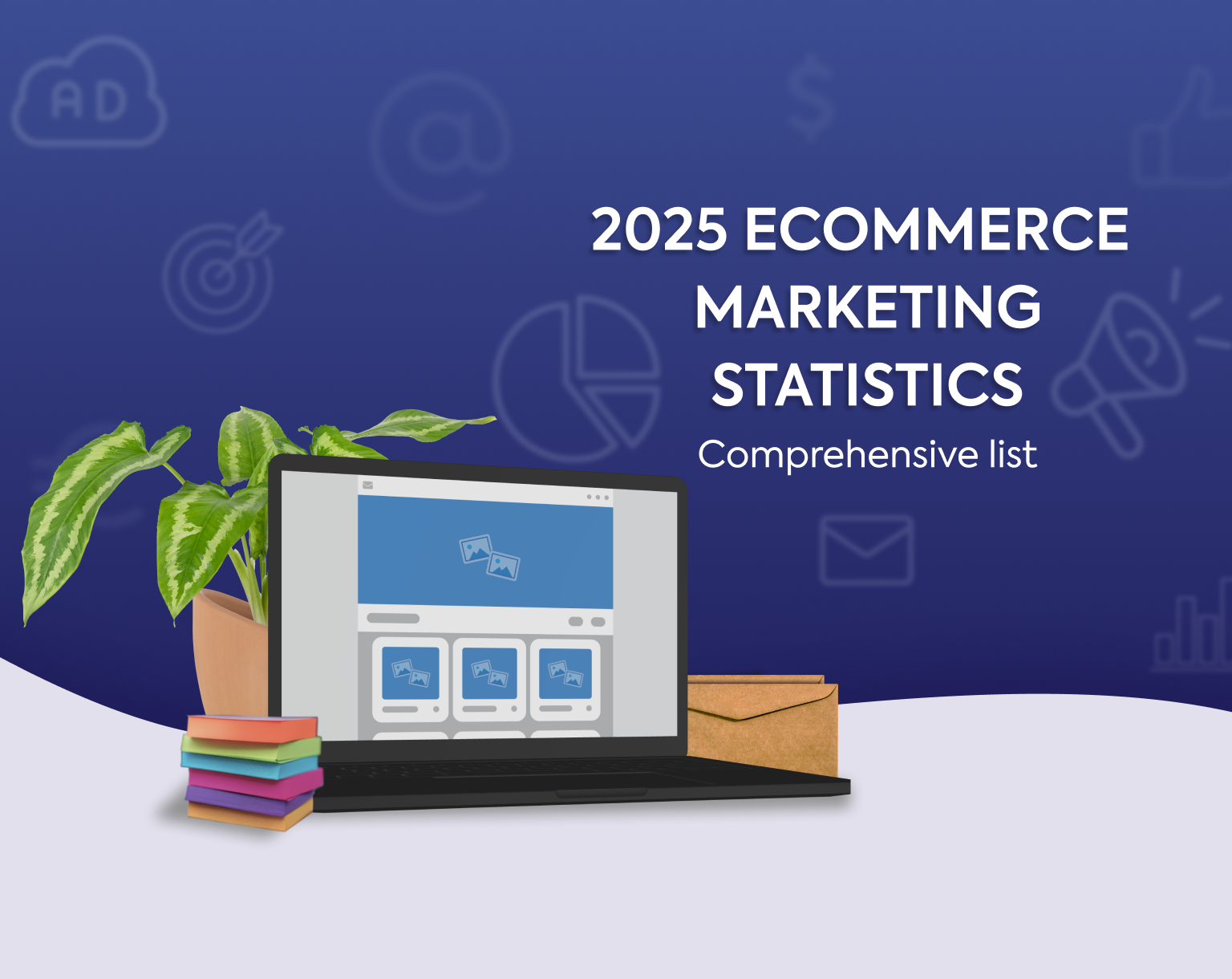
25+ Custom Manufacturing Software Statistics Showcasing Efficiency Gains and Cost Reductions
Key Custom Manufacturing Software StatisticsManufacturing ...

Author:
Tomislav Horvat

The global eCommerce industry, worth $5.920 trillion, is experiencing transformative effects from Generative AI.
AI implementation in logistics has resulted in a 15% reduction in logistics costs, a 35% improvement in inventory management, and a 65% boost in service levels.
Companies that implement AI strategies report an average revenue increase of 10-12% and project profitability gains of 59% by 2035.
By 2025, AI is projected to drive 95% of customer interactions, showcasing its pivotal role in modern communication.
Personalized product recommendations can lead to a remarkable 300% revenue increase, a 150% rise in conversion rates, and a 50% growth in average order values.
Amazon’s recommendation engine, powered by AI, is responsible for 35% of the company’s annual sales, emphasizing the system’s effectiveness.
AI-powered forecasting can cut supply chain errors by 30% to 50%, resulting in a 65% reduction in lost sales and 10-40% lower warehousing costs.
The global eCommerce industry, worth $5.920 trillion, is experiencing transformative effects from Generative AI.
In 2022, AI utilization in eCommerce was valued at $5.81 billion and is forecasted to soar to $22.6 billion by 2032, driven by a 14.60% compound annual growth rate (CAGR) between 2023 and 2032.
Between 2015 and 2021, global investment in AI for eCommerce increased more than fourfold, highlighting its rapid growth.
The global retail AI market, initially valued at $4.84 billion in 2021, is expected to grow to a remarkable $31.18 billion by 2028.
The global Conversational AI sector is projected to expand significantly, reaching a value of $13.9 billion by 2025.
By 2030, the AI-enabled eCommerce market is anticipated to grow to $16.8 billion, with a CAGR of 15.7%.
The AI-powered eCommerce sector is set to achieve a market size of $45.72 billion by 2032, emphasizing its impressive growth trajectory.
Forecasts predict that the AI in eCommerce market will achieve a value of $14 billion in the near future.
In just five years, the voice-enabled shopping market grew from a modest $2 billion in 2017 to an impressive $40 billion by 2022.
The global warehouse robotics market, valued at $6.1 billion in 2022, is projected to nearly triple, reaching $16 billion by 2030.
In India, the AI market in retail and eCommerce is expected to climb to INR 16,929.87 million by 2028, reflecting significant regional advancements.

AI ranks as the top priority for 84% of eCommerce businesses, underscoring its critical role in the industry.
A significant 83% of executives identify AI as a strategic priority within their organizations.
80% of retail and eCommerce businesses have integrated or are planning to adopt AI chatbots to enhance customer interaction.
Nearly 65% of companies are preparing to increase their investment in AI technologies over the next three years.
Over 60% of retail respondents intend to expand their investment in AI infrastructure within the next 18 months.
AI implementation in logistics has resulted in a 15% reduction in logistics costs, a 35% improvement in inventory management, and a 65% boost in service levels.
78% of eCommerce brands either have adopted or are planning to integrate AI technologies into their operations.
Over 50% of eCommerce businesses have embraced AI technologies to improve their efficiency and performance.
Among eCommerce executives, 54% see AI as a key tool for personalization, while only 4% view it as unnecessary.
In the U.S., 33% of B2B eCommerce companies have fully integrated AI, 47% are in the evaluation phase, and 3% have no plans for AI adoption.
Around 28% of leading online retail companies have incorporated AI and machine learning into their operations.
Since 2019, AI adoption among businesses has surged by a staggering 270%, showcasing its growing influence.
75% of IT leaders agree that AI technology significantly enhances security within their systems.
Only 1 in 10 retailers have successfully implemented personalization across all channels, highlighting room for improvement.
The biggest barriers to AI adoption include data security and privacy concerns (cited by 44% of CEOs and 53% of employees), a lack of expertise in AI (28% of CEOs and 43% of employees), and financial constraints (28% of CEOs and 34% of employees).

Companies that implement AI strategies report an average revenue increase of 10-12% and project profitability gains of 59% by 2035.
By 2035, AI technologies are anticipated to boost business productivity by 40%, revolutionizing operational efficiency.
Enterprises leveraging AI-based strategies have achieved at least 20% additional revenue, demonstrating the technology’s financial impact.
Businesses adopting AI-driven strategies see at least 20% revenue growth while reducing costs by an average of 8%, enhancing profitability.
A significant 79% of companies using AI in marketing and sales report higher revenues, with many achieving 20% additional revenue.
More than half (51%) of executives attribute AI integration to improved product performance, while 35% cite better decision-making capabilities.
AI-powered product bundling and personalized recommendations significantly boost average order values, driving higher sales.
Delivering personalized shopping experiences has been shown to increase retail revenue by 40%, underlining the importance of tailored strategies.
Personalized product recommendations can lead to a remarkable 300% revenue increase, a 150% rise in conversion rates, and a 50% growth in average order values.
By employing AI-driven recommendations, sales are expected to rise by an impressive 59%, showcasing AI’s role in revenue growth.
Amazon’s recommendation engine, powered by AI, is responsible for 35% of the company’s annual sales, emphasizing the system’s effectiveness.
Netflix saved $1 billion in potential lost revenue by using machine learning to enhance recommendation accuracy.
AI personalization results in 10-30% more efficient marketing and generates significant cost savings.
Amazon’s big data analytics, which updates prices every 10 minutes, has boosted annual profits by an average of 143%, highlighting the power of dynamic pricing.
Deploying AI for eCommerce leads to over a 25% improvement in customer satisfaction, revenue, or cost reduction, underscoring its multifaceted benefits.
AI technology has the potential to increase profits by more than 15%, all while maintaining consistent revenue levels.

71% of customers anticipate personalized interactions, while 76% feel frustrated when these expectations are not met.
63% of shoppers view AI-driven product recommendations as a major influence on their purchasing choices.
In 2024, 74% of U.S. consumers believe that AI enhances their shopping experience, while 6% feel it deteriorates the experience, and 21% report no impact at all.
Nearly 49% of shoppers express a desire to shop more often with retailers who excel in personalization.
83% of consumers are open to browsing or purchasing products through messaging-based conversations.
58% of Millennials and over 40% of Gen X and Baby Boomers prefer personalized product recommendations, while 51% of Millennials and around 40% of Gen Z, Gen X, and Baby Boomers favor frictionless payment systems.
43% of Baby Boomers actively resist incorporating AI personalization in their shopping journey
About 22% of users prefer engaging with AI voice assistants instead of typing.
26% of users report that AI voice assistants provide easier access to features.
Gender-based responses to AI in shopping indicate that 9% of male shoppers and 10% of female shoppers find that AI improved their experience, whereas 13% of men and 15% of women feel it negatively impacted their experience.

By 2025, AI is projected to drive 95% of customer interactions, showcasing its pivotal role in modern communication.
By 2027, 25% of companies are anticipated to make chatbots their primary customer service tool, and by 2030, 80% of customer interactions are expected to be managed by AI systems.
AI-driven chatbots are already handling 70% of online customer conversations, demonstrating their efficiency and widespread use.
In 2020, a notable 8 out of 10 businesses incorporated AI into their customer service operations, marking a significant adoption rate.
Nearly 48.9% of U.S. retail companies leverage AI for marketing automation, while 31% utilize virtual agents and chatbots for enhanced customer engagement.
Currently, 23% of companies have adopted AI chatbots, with an additional 31% planning to implement them by 2024, indicating a strong growth trend.
Facebook Messenger hosts a thriving community of over 300,000 active chatbots, solidifying its role as a major chatbot platform.
By reducing reliance on human agents, AI enables 24/7 customer support at a fraction of traditional costs, redefining service accessibility.
AI chatbots can cut customer query resolution times dramatically, shrinking it from an average of 38 hours to just 5.4 minutes, showcasing their efficiency.
In 2024, 24% of U.S. consumers reported regularly using chatbots while shopping, with 61% valuing their 24/7 availability and 45% appreciating instant responses.
Luxury Escapes' AI chatbot boosted retargeting response rates by an impressive 89%, underlining the potential for AI in customer engagement.
AI-driven chatbots have become a cornerstone of eCommerce support, with companies like Bank of America employing them for real-time client interactions.
The customer service automation market powered by AI is forecasted to expand at a CAGR of 58.5%, reaching a value of $1 billion, underscoring its rapid growth.

Personalized recommendations make a significant impact, with 91% of consumers more likely to shop with brands offering them, 80% more likely to purchase when experiences are tailored, and 66% choosing to stop shopping with sites that deliver impersonal content.
Among eCommerce platforms, 71% offer product recommendations, with the Nordic countries leading the way—90% of shoppers there report benefiting from personalized suggestions.
A substantial 70% of eCommerce executives believe that AI will enhance personalization, while 54% also view AI as essential for improving site search functionality.
Replacing traditional communication channels like email with AI-driven messaging can achieve click-through rates up to 13 times higher.
AI personalization significantly impacts growth, improving customer acquisition by 3-5%.
Businesses using AI for personalization report gains in customer satisfaction and engagement by 5-10%.
Leveraging AI-powered bundling and tailored product recommendations leads to higher average order values, driving increased revenue.

AI adoption in sales and marketing is reported by an impressive 84% of marketers, showcasing its widespread integration into the industry.
A notable 76% of marketers are actively utilizing AI-powered tools to enhance their content creation efforts.
Among Amazon sellers, 34% rely on AI to craft and optimize listings, while 14% use it to produce marketing and social media content, and 7% apply it for keyword research and SEO advancements.
Over the next year, 10% of companies plan to direct investments toward AI-driven digital content creation, highlighting its growing importance.

36% of decision-makers highlight that AI empowers employees to focus on creative tasks by automating routine operations, while 23% leverage it to reduce workforce size through automation.
AI chatbots dramatically cut down customer query resolution times, reducing the average from 38 hours to just 5.4 minutes.
By utilizing chatbots, companies can achieve up to an 80% reduction in customer service costs.
AI-driven chatbots have been shown to reduce customer service expenses by as much as 30%.
With AI-enabled fraud detection, losses are minimized by identifying unusual patterns that traditional systems often fail to catch.
AI-powered forecasting can cut supply chain errors by 30% to 50%, resulting in a 65% reduction in lost sales and 10-40% lower warehousing costs.
Leveraging AI forecasting, businesses can lower inventory costs by up to 75%, improve on-time delivery rates by 85%, and achieve a 10% boost in revenue.
AI implementation in logistics has led to a 15% decrease in logistics costs, showcasing its efficiency.
Walmart employs advanced demand forecasting to better manage inventory and predict consumer demand across its network of stores.
Coca-Cola utilizes AI-driven models to anticipate seasonal demand and streamline production processes.
With Alibaba’s smart logistics program, delivery errors have been reduced by an impressive 40%.
FedEx integrates AI-driven automation tools in its distribution centers, enhancing sorting efficiency, robotics operations, and package delivery optimization.

Over the last five years, career transitions into data and AI roles have surged by 50%, and 65% of job skills are expected to undergo transformation by 2030, driven by AI advancements.
36% of decision-makers believe that AI enhances employee creativity by freeing them from mundane tasks, while 23% have leveraged AI for workforce reduction through automation.
43% of organizations are planning to downsize their workforce as they adopt new technologies, showcasing the disruptive nature of AI integration.
By enabling round-the-clock support at a fraction of the cost, AI has minimized reliance on human customer service agents, streamlining customer interactions.
Precedence Research, Statista, Gartner, McKinsey, BairesDev, Forrester, Intersog, Ecommerce News, Influencer Marketing Hub, PR Newswire, Kimp, The Good, eMarketer, NVIDIA, PwC, eMarketer (Generative AI Impact), and Pew Research.

